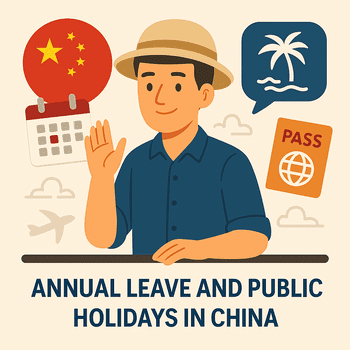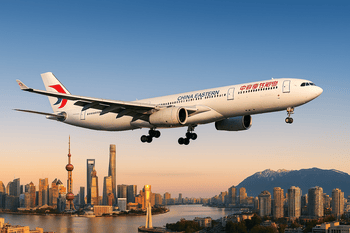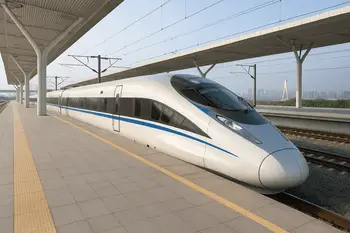
China’s leave system combines statutory holidays with annual leave entitlements, creating a unique framework that differs significantly from Western practices.
This guide provides expats with current, practical information on navigating China’s holiday system, understanding your legal entitlements, and effectively planning your time off in 2025.
1. Legal Framework for Leave in China
China’s leave policies are governed by several key regulations that establish minimum standards for all employees, including expatriates.
Key Legislation Governing Leave Entitlements
| Legislation | Year Enacted | Key Provisions | Applicability to Foreigners |
|---|---|---|---|
| Labor Law of the PRC | 1995 | Establishes basic right to paid leave | Applies to all employees including foreigners |
| Labor Contract Law | 2008 | Requires leave terms in employment contracts | Applies to all formal employment relationships |
| Regulations on Paid Annual Leave for Employees | 2008 | Details specific annual leave entitlements | Primary regulation for annual leave calculation |
| State Council Holiday Arrangement Notices | Updated annually | Sets official holiday calendar | Defines public holiday schedule |
Important Note for Expats: While these laws apply to all employees in China, employment contracts for expatriates may include additional provisions that exceed statutory minimums. Always refer to your specific contract terms.
2. Public Holidays in China for 2025
China’s public holiday schedule is announced annually by the State Council, with dates for traditional lunar calendar holidays varying each year.
Official 2025 Public Holiday Schedule
| Holiday | 2025 Dates | Official Days Off | Work Makeup Days |
|---|---|---|---|
| New Year’s Day | Jan 1 (Wed) | 1 day | None |
| Spring Festival | Jan 28-Feb 4 | 8 days | Jan 26 (Sun), Feb 8 (Sat) |
| Qingming Festival | Apr 4-6 | 3 days | None |
| Labor Day | May 1-5 | 5 days | Apr 27 (Sat) |
| Dragon Boat Festival | May 31-Jun 2 | 3 days | None |
| Mid-Autumn Festival & National Day | Oct 1-8 | 8 days | Oct 11 (Sat) |
Source: Official State Council Holiday Announcement (Note: The 2025 schedule is typically released in late 2024)
Understanding “Work Makeup Days”
China’s unique holiday system often rearranges weekends to create longer continuous holiday periods:
- Weekend shifts: The government designates certain weekends as working days to “make up” for weekdays that become holidays
- Example: For Spring Festival 2025, Sunday January 19 and Sunday February 2 become working days to compensate for extended weekday holidays
- Mandatory compliance: These adjustments are legally binding for all employers and employees
3. Annual Leave Entitlements
Beyond public holidays, employees in China are entitled to paid annual leave based on their total working years.
Statutory Annual Leave Allowance
| Total Working Years | Statutory Annual Leave | Common Expat Package | Leave Calculation Period |
|---|---|---|---|
| Less than 1 year | Prorated based on months worked | Often negotiated separately | Calendar year (Jan-Dec) |
| 1-9 years | 5 working days | 10-15 working days | Calendar year (Jan-Dec) |
| 10-19 years | 10 working days | 15-20 working days | Calendar year (Jan-Dec) |
| 20+ years | 15 working days | 20-25 working days | Calendar year (Jan-Dec) |
Important Clarifications:
- “Total working years” includes all employment, not just with current employer
- Previous employment outside China is typically counted for expatriates
- Annual leave is calculated on a calendar year basis (January to December)
Source: Ministry of Human Resources and Social Security
Industry-Specific Variations
| Industry | Typical Variation from Standard | Reason |
|---|---|---|
| Education | Longer fixed holidays, less flexible annual leave | Follows academic calendar |
| Technology | More flexible leave policies, occasional “unlimited” leave | Competitive talent attraction |
| Manufacturing | Stricter leave scheduling, often around production cycles | Production continuity requirements |
| Finance | Standard leave with blackout periods | Regulatory reporting periods |
| Foreign-invested enterprises | More generous leave policies | International standards |
4. Leave During Probation Period
Many expats are unclear about leave entitlements during probation periods, which typically range from 1-6 months.
| Leave Type | Entitlement During Probation | Legal Basis |
|---|---|---|
| Annual Leave | Accrued but often not permitted to use | Labor Contract Law |
| Public Holidays | Fully entitled | Labor Law |
| Sick Leave | Entitled with proper medical documentation | Medical Leave Regulations |
| Personal Leave | At employer discretion | Company policy |
Best Practice: Clarify probation leave policies before signing your employment contract, as practices vary widely among employers.
5. Holiday Pay and Compensation
Understanding how holiday work is compensated is essential for expats who may be asked to work during holidays.
Compensation for Holiday Work
| Situation | Legal Minimum Compensation | Common Practice |
|---|---|---|
| Working on public holidays | 300% of normal wages | 300% pay or equivalent time off |
| Working on annual leave days | 200% of normal wages or alternative day off | Alternative day off plus compensation |
| Unused annual leave | 200% of daily wage per unused day | Payout at end of year or contract |
Legal Requirement: Employers must compensate employees who are unable to take their annual leave due to work requirements at 200% of their daily wage for each unused day.
Source: Regulations on Paid Annual Leave for Employees, Article 10
6. Regional Variations in Holiday Observance
China’s provinces and autonomous regions sometimes observe additional local holidays or have different practices.
Notable Regional Holiday Variations
| Region | Additional Holidays | Details |
|---|---|---|
| Hong Kong SAR | Different holiday schedule | Observes Hong Kong public holidays, not mainland schedule |
| Macau SAR | Different holiday schedule | Combines Chinese and Portuguese holiday traditions |
| Tibet Autonomous Region | Tibetan New Year, Shoton Festival | Additional local holidays with regional significance |
| Xinjiang Uyghur Autonomous Region | Corban Festival, Roza Festival | Muslim holidays observed regionally |
| Ethnic minority areas | Various traditional festivals | Local governments may grant additional time off |
Expat Tip: If working in areas with significant ethnic minority populations, check with local HR departments about additional observed holidays.
7. Leave Application Process and Best Practices
Understanding the typical leave request process in Chinese workplaces helps avoid misunderstandings.
Standard Leave Application Timeline
| Leave Duration | Typical Required Notice | Approval Process | Documentation |
|---|---|---|---|
| 1-2 days | 3-7 days in advance | Direct supervisor approval | Internal leave form |
| 3-5 days | 1-2 weeks in advance | Department head approval | Internal leave form |
| 5+ days | 2-4 weeks in advance | Senior management approval | Detailed leave plan |
| During busy periods | 1+ month in advance | Multiple approvals may be required | Justification may be needed |
Cultural Insight: In Chinese workplace culture, leave requests are often seen as negotiable rather than absolute entitlements. Building good relationships with supervisors can significantly impact leave approval.
8. Leave Carryover and Expiration Policies
Understanding what happens to unused leave is particularly important for expats.
| Scenario | Legal Requirement | Common Practice | Expat Consideration |
|---|---|---|---|
| Unused annual leave | Must be compensated at 200% | Some companies allow partial carryover | Negotiate carryover in contract |
| Maximum carryover period | Not specified in law | Typically until end of Q1 next year | Use or lose by specified date |
| Contract termination | Unused leave must be compensated | Calculated in final settlement | Ensure documentation of unused days |
Legal Protection: According to Article 10 of the Regulations on Paid Annual Leave, employers cannot cancel employees’ annual leave entitlement. If employees cannot take leave due to work requirements, they must be compensated.
9. Sick Leave vs. Annual Leave
Many expats confuse sick leave with annual leave entitlements in China.
Comparison of Leave Types
| Aspect | Annual Leave | Sick Leave | Personal Leave |
|---|---|---|---|
| Legal basis | Guaranteed by law | Guaranteed by law | Company discretion |
| Duration | 5-15 days based on service years | Based on medical condition and service length | Varies by company |
| Compensation | 100% of salary | 60-100% based on service length and condition | Often unpaid or partially paid |
| Documentation | Simple request form | Medical certificate required | Varies by company |
| Approval process | Planned in advance | Notification as soon as possible | Varies by company |
Sick Leave Entitlement: The standard sick leave allowance ranges from 3 months to 24 months depending on total working years and severity of illness, with compensation ranging from 60% to 100% of regular wages.
10. Optimizing Your Time Off in 2025
Strategic planning can help expats maximize their time off by combining annual leave with public holidays.
2025 Strategic Leave Planning Opportunities
| Holiday Period | Strategy | Days Used | Total Break |
|---|---|---|---|
| Spring Festival (Jan 25-31) | Take Jan 20-24 as annual leave | 5 days | 16 days (Jan 18-Feb 2) |
| Labor Day (May 1-5) | Take Apr 28-30 as annual leave | 3 days | 10 days (Apr 26-May 5) |
| National Day (Oct 1-7) | Take Sep 29-30 as annual leave | 2 days | 9 days (Sep 27-Oct 5) |
| Christmas/New Year | Take Dec 26-31 as annual leave | 5 days | 9 days (Dec 25-Jan 2, 2026) |
Planning Tip: Book popular holiday periods well in advance, as many companies limit the number of employees who can take leave simultaneously during peak periods.
11. Dispute Resolution for Leave Issues
Knowing your rights and the proper channels for addressing leave disputes is essential for expats.
Steps for Resolving Leave Disputes
- Review your contract and relevant company policies
- Discuss with HR and provide documentation of your entitlement
- Consult the local Labor Bureau (劳动局) for guidance
- File a formal complaint with the Labor Dispute Arbitration Committee if necessary
- Seek legal counsel specializing in employment law for foreigners
Resource: China Labor Dispute Resolution Guide
Conclusion
Understanding China’s leave system requires attention to both statutory requirements and company-specific policies.
While the legal framework establishes minimum standards, actual practices vary widely across industries and regions.
By familiarizing yourself with both the legal entitlements and cultural expectations surrounding leave, expats can better navigate time off in China while maintaining positive workplace relationships.
For the most current information, always check the official government announcements for holiday schedules and consult your employment contract for specific leave entitlements.
Additional Resources:



